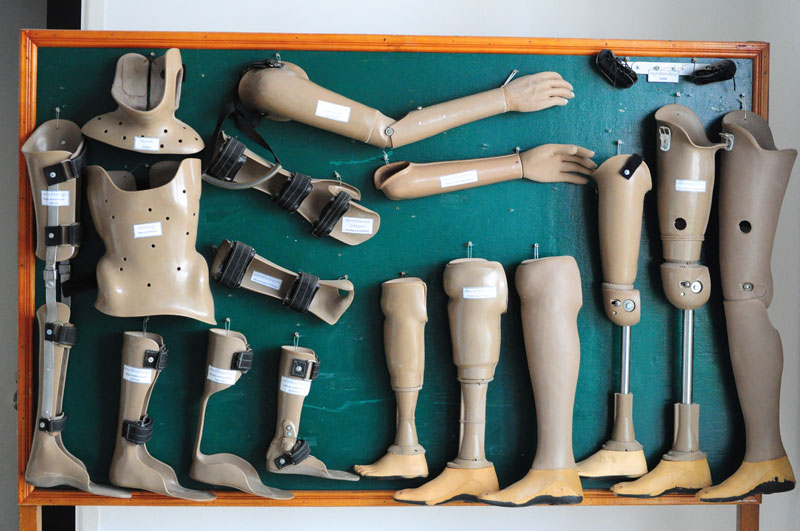In 1990, Pen Hoeurng was out in the field tending her cows and buffalo when the rattle of machine-gun fire erupted in the surrounding forest and she was struck by a bullet from an M-16.
Ms. Hoeurng, now 48, does not know whether she was shot at deliberately or accidentally hit by fire from the Khmer Rouge guerrillas who still patrolled large areas of the countryside at the time.

She lost her lower leg as a result of the wound, joining the thousands of amputees who have lost limbs as a result of Cambodia’s years of war—8,921 alone from land mines and unexploded ordnance since 1979—as well as those suffering from conditions such as polio, tuberculosis, cerebral palsy, and club foot.
“For the first three years after my leg was amputated, I just used a bamboo cane to get around, but in 1993 I got my first ever prosthetic limb,” Ms. Hoeurng recalled.
Ms. Hoeurng is one of thousands of disabled people who have benefited from the work of the Cambodia Trust—recently renamed Exceed—a U.K.-based charity set up in 1989 to provide prosthetics services for landmine victims in Cambodia, with high-profile support from film producer David Puttnam and Roland Joffe, who directed “The Killing Fields.”
Since 1993, she has been returning to the Cambodian School of Prosthetics and Orthotics (CSPO) in Phnom Penh’s Stung Meanchey district—where students learn how to prescribe, manufacture and fit artificial limbs and orthotic braces—whenever her prosthetic wears out through use and she requires a new one to be molded.
But the organization has come a long way since it opened its first rehabilitation center at Calmette Hospital in 1991. As well as setting up the CSPO clinic and training school in 1994, it opened additional clinics in Preah Sihanouk and Kompong Chhnang provinces, establishing what is now a network of 16 rehabilitation centers spread across the country.
The experience and expertise the Cambodia Trust gained here led the organization, with the support of its principal donor Nippon Foundation, to establish training schools in the Philippines, Indonesia, Sri Lanka and, most recently, Burma, with a regional commitment to helping disabled people get into schools, university and employment.
But the expansion from an NGO specific to Cambodia to a multinational organization meant that the group’s name no longer reflected the scope of its work, and after much soul searching, this month the organization decided to change its name to Exceed.
“I am a bit guilty that there will be no more Cambodia Trust, but we never expected that the Cambodian model would go so far, meaning that the name had become too small—we had become bigger than our clothes,” said chief executive Carson Harte, an Irishman who starting working for the organization in 1993.
“Exceed means to go further and to do more than we expected, more than we thought we would be able to do,” Mr. Harte added.
Before joining the Cambodia Trust, Mr. Harte trained in Glasgow and worked in Belfast, Northern Ireland, from 1982 to 1993, where he treated victims of “the Troubles” who had lost limbs to bombs and punishment shootings by paramilitary groups, as well as various medical conditions that can result in amputation.
He and his family moved to Cambodia in 1993 to run the Cambodia Trust’s first training school, with a goal of educating enough locals to man the rehabilitation centers themselves.
“After the first phase of training 50 or 60 Cambodians was complete, we thought it would be a real shame to let the school close and lose its expertise, so the decision was made to keep the school open,” he said.
Selling 75 percent of the places in the school to overseas students enables the Cambodian operation to be 70 percent self-funded, with 12 to 14 students from as far away as Afghanistan, Iraq and North Korea enrolling every year for the three-year internationally accredited training courses, living on campus in Phnom Penh.
“It’s the only Cambodian institution where people come and pay to be educated; usually it’s the other way around,” Mr. Harte said, adding that he sees his greatest achievement as the appointment of former student Sisary Kheng as the organization’s country director in Cambodia.
Mr. Harte wants to ensure the sustainability of the organization for the next 25 years by expanding the operation, selling prosthetic limbs and putting the profits back into Exceed.
With more than 200 prosethetists and orthotists having graduated from the schools to date and more than 7,000 devices now being made annually in Cambodia alone, Mr. Harte believes Exceed is well equipped to make the direction change work.
“It’s purely a Robin Hood philosophy: We want to produce high-end, differentiated prosthetics to the guy who can afford it so that as a not-for-profit business we can generate income and keep it in the system to subsidize student fees and look after the poor,” he said.




